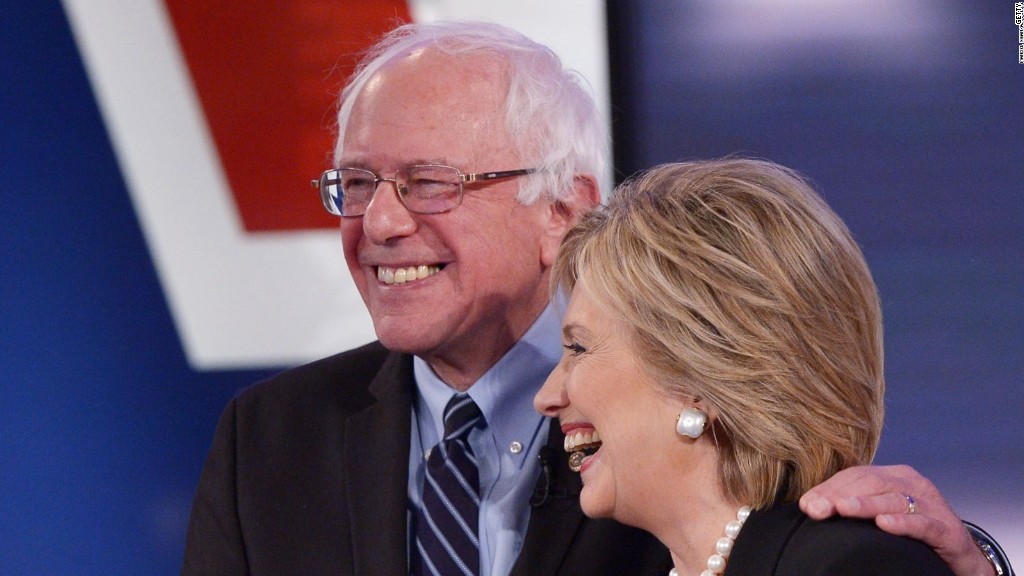
Wall Street is "feeling the Bern."
In a major speech Tuesday, Bernie Sanders vowed to cap ATM fees at $2, and said that no one from Goldman Sachs (GS) would ever work in his administration.
It's a direct hit at Hillary Clinton. One of her top advisers is 18-year Goldman veteran Gary Gensler. And Bill Clinton had Goldman alums in his inner circle too, including Treasury Secretary Robert Rubin.
Sanders has made Wall Street a top issue, and says bankers are "destroying the very fabric of our nation." It's helping him remain competitive in key states like Iowa and, especially New Hampshire.
A decade ago, about half of America trusted banks. Now that trust has fallen to a historic low of just 20%, according to Gallup.
"Greed, fraud, dishonesty and arrogance. These are some of the words that best describe the reality of Wall Street today," Sanders said.
Bernie wants to break up the banks
The only solution, Sanders says, is to break up big banks like JPMorgan Chase (JPM), Bank of America (BAC) and Wells Fargo (WFC) so taxpayers will never have to bail them out again.
Hillary Clinton isn't willing to go that far.
Sanders claims it's because she is too friendly with Wall Street. Hillary has made millions by giving speeches to the big banks for hefty fees.
Hillary and her surrogates fire back that Sanders is naive, and that his plan doesn't address the increasing role of hedge funds and other non-bank players.
Sanders addressed those criticism Tuesday, saying that in the first days of his presidency, his administration would make a list of "too big to fail" commercial banks, shadow banks and insurers.
Related: Wall Street isn't worried about Hillary Clinton's plan
ATM fees are too high
ATM fees are another frustration for many Americans. The big banks make billions off over overdraft fees alone. Consumers now pay an average of over $4 to withdraw their own money from an out-of-network ATM, according to Bankrate.
"In my view, it is unacceptable that Americans are paying a $4 or $5 fee each time they go to the ATM," Sanders said.
Hillary has also called ATM fees too high and "usurious."
Bring back Glass-Steagall?
When it comes to Wall Street, the key difference between the two leading Democratic contenders is over whether to reinstate the Glass-Steagall Act, a banking regulation that was in place from the Great Depression era through 1999 -- when Congress and then President Clinton repealed it.
Glass-Steagall kept banks smaller than they are today because it prevented them from engaging in both "Wall Street" and "Main Street" activities. They had to specialize in either lending, trading or insurance.
Financial strategists think Sanders has made it enough of an issue though that if Hillary becomes the nominee, she will have to make bigger promises on how to curtail Wall Street.
"We believe the most likely outcome if a Democrat wins the White House are negative actions for big banks and big nonbanks. We continue to believe a mega financial firm tax is the most likely response right out of the box," wrote Jaret Seiberg of Guggenheim Partners in a note.
Hillary has proposed a fee on large banks with assets over $50 billion.


